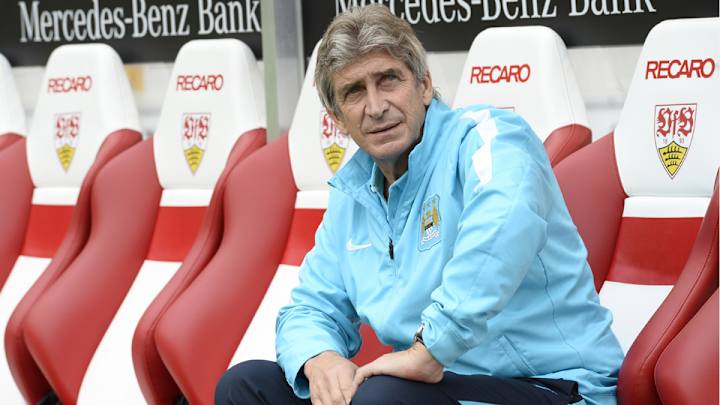Manuel Pellegrini's contract extension brings stability to Manchester City

The Friday before a new Premier League season starts is always a busy one. Every club manager has his weekly press conference briefing, where, on this particular day, he will deflect questions about transfer targets and talk about the squad being the strongest it’s ever been.
Occasionally, a coach will say something interesting. Manchester United’s Louis van Gaal did just that Friday, admitting that David de Gea, the goalkeeper and Player of the Year last season, won’t start Saturday’s game against Tottenham Hotspur because he’s not in the right frame of mind. He’s angling for a move to Real Madrid and it’s not happening at the moment.
• Podcast: Brad Friedel on the Premier League season, Howard vs. Guzan
Across town at Manchester City, you’d never hear such a thing. Since Manuel Pellegrini replaced the combustible Roberto Mancini as coach, press conferences have become dour affairs. Pellegrini is a master at straight-batting questions.
And yet City provided the story of the build-up with the news Friday that Pellegrini has extended his contract, due to expire next summer, by one more year to 2017. The summer months had been full of questions about Pellegrini’s future, especially after Pep Guardiola, long-coveted by City’s sporting director TxikiBegiristain, said he was undecided about his next move once his Bayern Munich contract expires, also next summer.
In simple terms, City’s announcement puts an end to the Pep question—or at least puts it on hold—and increases Pellegrini’s authority with his players, which can often wane for any coach in his final year.
EPL Season Preview: 10 storylines to follow as a new season begins
Pellegrini claimed he never felt under pressure after dropping from joint-first (on New Year’s Day) to fourth place following four wins in 15 matches. Was he worried that he might be shown the door? “Never,” he told Chilean newspaper El Mercurio last month. “I knew the inner reality of the club. Rather than worry about the press, I was trying to lift the team. I am the most responsible [for the disappointing season] because I am the one who handles the group.”
These days City likes to keep things private. Everything was made public under Mancini, including training-ground bust-ups that sometimes involved the coach, but now very little is revealed. That is how the owners from Abu Dhabi like it, and Pellegrini is at the heart of this—he is low-key, non-confrontational, respectful and professional. His outburst at referee Jonas Eriksson after a Champions League defeat to Barcelona last year was surprising because it was so out-of-character. And even though City’s most recent season was also disappointing, there was never a moment Pellegrini lost that self-control.
The irony is that in his playing days in Chile, Pellegrini was so aggressive and belligerent that his nickname was “Peligroso,” a pun on the word meaning “dangerous” in Spanish.
“I always had an explosive character,” he once revealed in an interview with Jotdown’s Alvaro Corazon Rural. “But if I managed to spend 14 years playing for one of the best clubs in Chilean football (Universidad de Chile), it is certainly not because I was dangerous. It’s because I was disciplined.
EPL season preview: Relegation fight, bottom-half outlook for 2015-16
“I tried to control myself and change when I became a coach. It is important to convey serenity from the sideline. Players do not need to see that the man in charge is losing it, they are already stressed enough as it. That's why I constantly struggle to maintain this apparent tranquillity. Today, I can control myself enough not to explode.”
He has also cited the work of American psychologist David Goleman, who wrote “Emotional Intelligence: Why it Can Matter More than IQ,” as a major influence. Written in 1995, Goleman breaks down the five key elements of Emotional Intelligence that help in relationships, work and physical well-being: self-awareness, altruism, personal motivation, empathy and the ability to love and be loved. That message changed Pellegrini’s approach to his players, which before then was far more scientific (he trained as an engineer before becoming a coach).
Pellegrini’s “mea culpa” for last season came with a rider. “It's not an excuse, but we did not have to be the favorites when Chelsea, Liverpool, Arsenal, and Manchester United could spend what they wanted. When you need a team to strengthen after it has become champion, it is an important upgrade.” This was a dig at UEFA’s Financial Fair Play regulations—since relaxed—but it did not prevent City spending £42 million for Eliaquim Mangala, a center back who did not look worthy of the price tag (a decision which could, of course, change this season).
Pellegrini has played his hand smartly. Other coaches might have agitated for an extension in public—Tim Sherwood did just that during his “interim” spell at Spurs and it did not help his case—or kicked up more of a stink as the season looked like it was slipping away. Instead, a run of six wins at the end of last season pushed City into second and the arrival of Raheem Sterling this summer has encouraged City fans to believe a title challenge is possible.
The most important aspect of this new deal is that it gives City stability. Not every press conference will be dominated by talk of Pellegrini’s future, nor of Guardiola’s latest pronouncements. The Spaniard is still City’s ideal coach to start next season, but at least the back-up plan is a “known-known.” All Pellegrini can do is try and win the title, and the Champions League. Even if he does that, if Guardiola says yes to City, it won’t keep him in the job.

A journalist, broadcaster and consultant, Ben Lyttleton also wrote the book on PKs with his “Twelve Yards: The Art and Psychology of the Penalty Kick.”